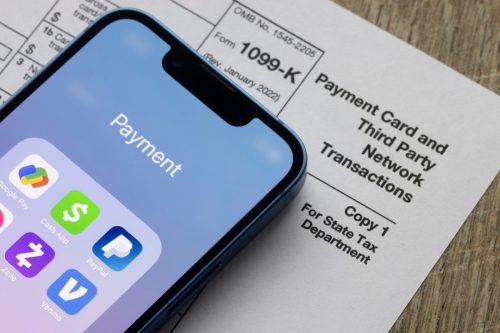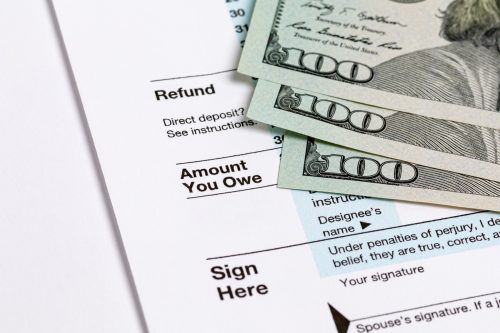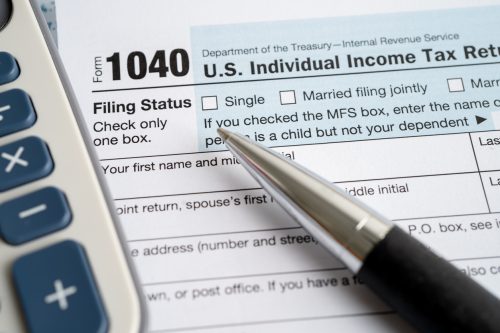IRS Has Announced All These Changes to Your Taxes—Will You Be Affected?

One thing never changes from year to year: filing our taxes to the Internal Revenue Service (IRS). While the deadline may shift slightly on an annual basis depending on different circumstances, at some point, your return is due. The details, however, change constantly, and there are a number of shifting rules and regulations you need to make sure you have a handle on. In fact, several adjustments have already been announced ahead of the next filing season. Read on to discover the changes the IRS has made to your taxes recently, and whether you’ll be affected by them.
RELATED: IRS Issues New Alert on What You Must Do Before the Year Is Over.
New tax rules were previously enacted for reporting third-party platform payments.

Two years ago, a new law was created for those making money via apps like Venmo and Cash App. As part of the 2021 American Rescue Plan, Congress set a new threshold requirement for those conducting goods and services transactions through these third-party platforms. Based on the law, anyone making $600 or more from Venmo or the like would be required to report that on their taxes.
But last year, the IRS decided to delay these new reporting requirements for those filing their 2022 returns. And now, the agency is pushing things back again.
RELATED: 6 Tax Return Secrets From Accountants.
The IRS is changing things to delay this requirement.

The IRS is planning to push the implementation of the 2021 rule for the second year in a row. In a Nov. 21 press release, the agency announced another delay in the $600 reporting threshold for the upcoming tax season. This decision was made “following feedback from taxpayers,” according to the release.
“We spent many months gathering feedback from third party groups and others, and it became increasingly clear we need additional time to effectively implement the new reporting requirements,” IRS Commissioner Danny Werfel said in a statement. “Taking this phased-in approach is the right thing to do for the purposes of tax administration, and it prevents unnecessary confusion as we continue to look at changes to the Form 1040. It’s clear that an additional delay for tax year 2023 will avoid problems for taxpayers, tax professionals and others in this area.”
Due to this delay, taxpayers will not be required to report their third-party payments on their next tax returns, unless they received over $20,000 and had more than 200 transactions for this calendar year.
“As the IRS continues to work to implement the new law, the agency will treat 2023 as an additional transition year,” the agency noted.
RELATED: Taking These 2 Deductions Could Get You Audited by the IRS, Experts Warn.
The agency also made adjustments to gift and estate tax exemption limits.

The IRS just announced another tax change—although this one won’t affect how you file your 2023 taxes. According to GoBankingRates, the agency just increased their limits for gift and estate tax exemptions to the “highest exclusion amounts ever.” In other words, you can give more away without being taxed for it next year.
Right now, you can give an individuals up to $17,000 each in a single year without taxation. But in 2024, this rate will raise to $18,000, GoBankingRates reported. Married couples will also be able to give $36,000 to beneficiaries starting next year.
Alongside this, the IRS is increasing the lifetime estate and gift tax exemption to $13.61 million in 2024.
Your tax brackets may be affected next year, too.

But there’s another more pressing change. Last month, the IRS announced changes to tax brackets for the 2023 tax season. Taking into account inflation, the new rates have pushed the upper limits 7 percent higher than in the 2022 tax year, Forbes reported.
As a result, you may owe a different amount in taxes, even if your income hasn’t changed from the last time you filed. With the change, the lowest tax bracket begins at 10 percent for individuals with $11,000 or less in taxable income, or $22,000 for married couples filing jointly. If you make between $11,001 and $44,725 as an individual, this rate goes up to 12 percent. Meanwhile, individuals making between $44,726 and $95,375 will fall into a 22 percent bracket, and those earning between $95,376 and $182,100 will fall into the 24 percent bracket.
Continuing on into the higher incomes, individuals making between $182,101 and $231,250 now have a rate of 32 percent, while people earning between $231,251 and $578,125 fall into a 35 percent rate. The highest bracket affects those who take in $578,126 or more in 2023, who will now pay 37 percent in taxes.
RELATED: For more up-to-date information, sign up for our daily newsletter.
Best Life offers the most up-to-date financial information from top experts and the latest news and research, but our content is not meant to be a substitute for professional guidance. When it comes to the money you’re spending, saving, or investing, always consult your financial advisor directly.